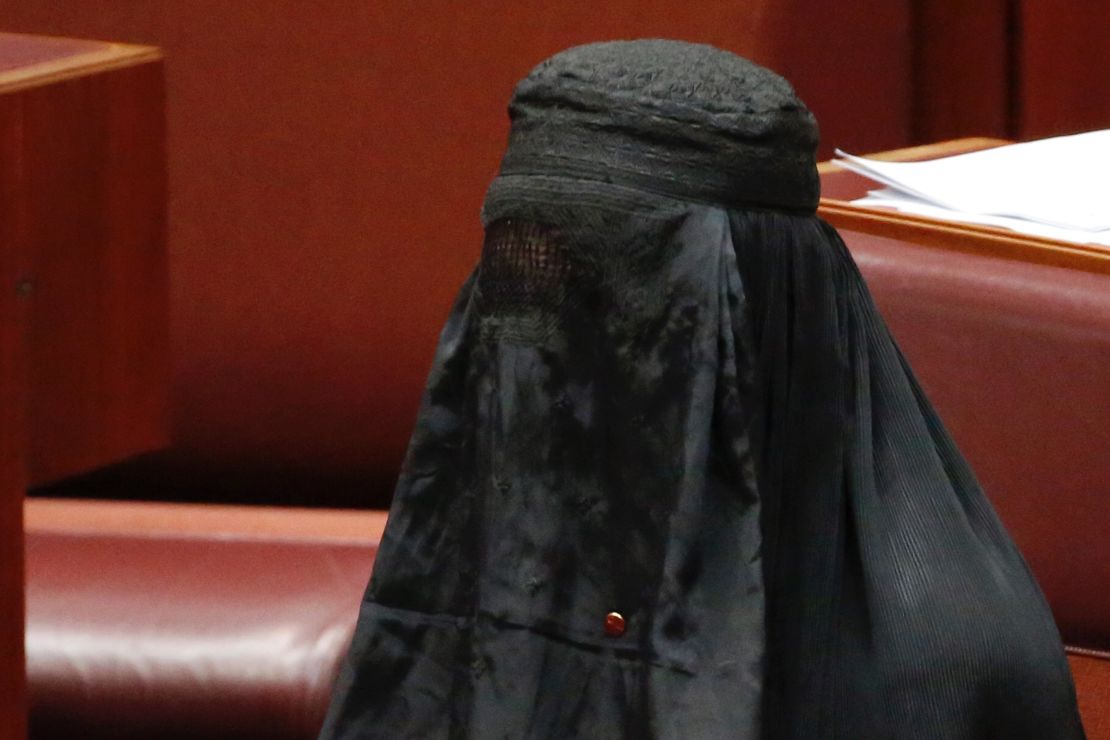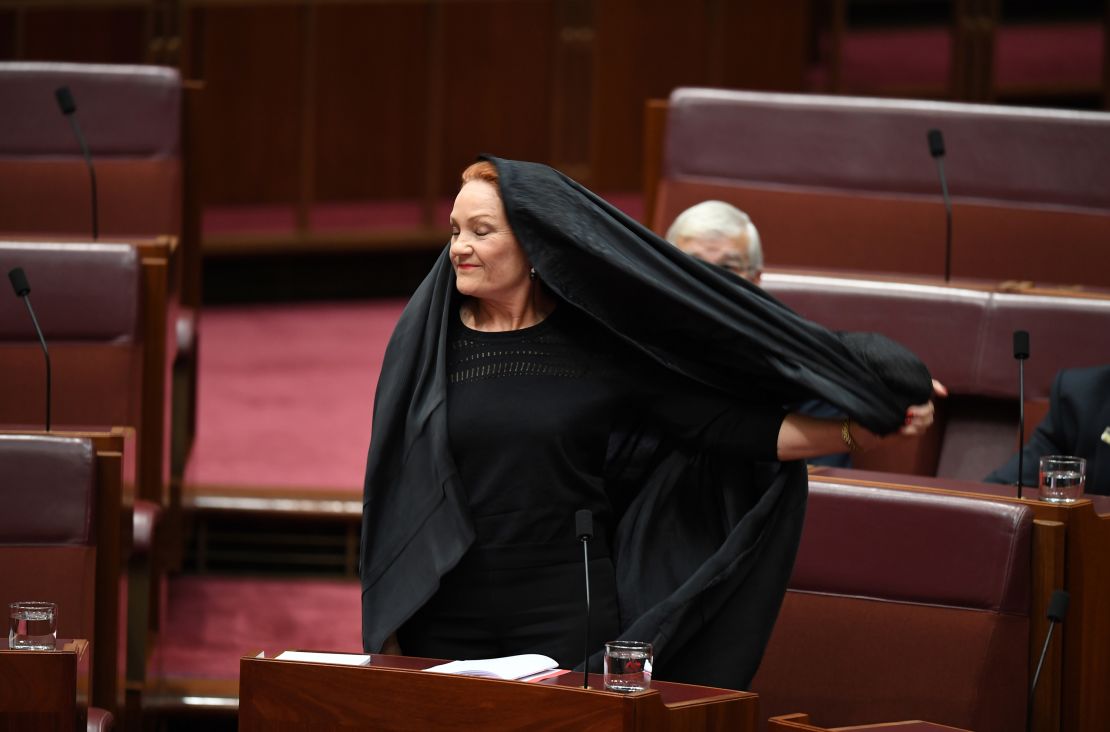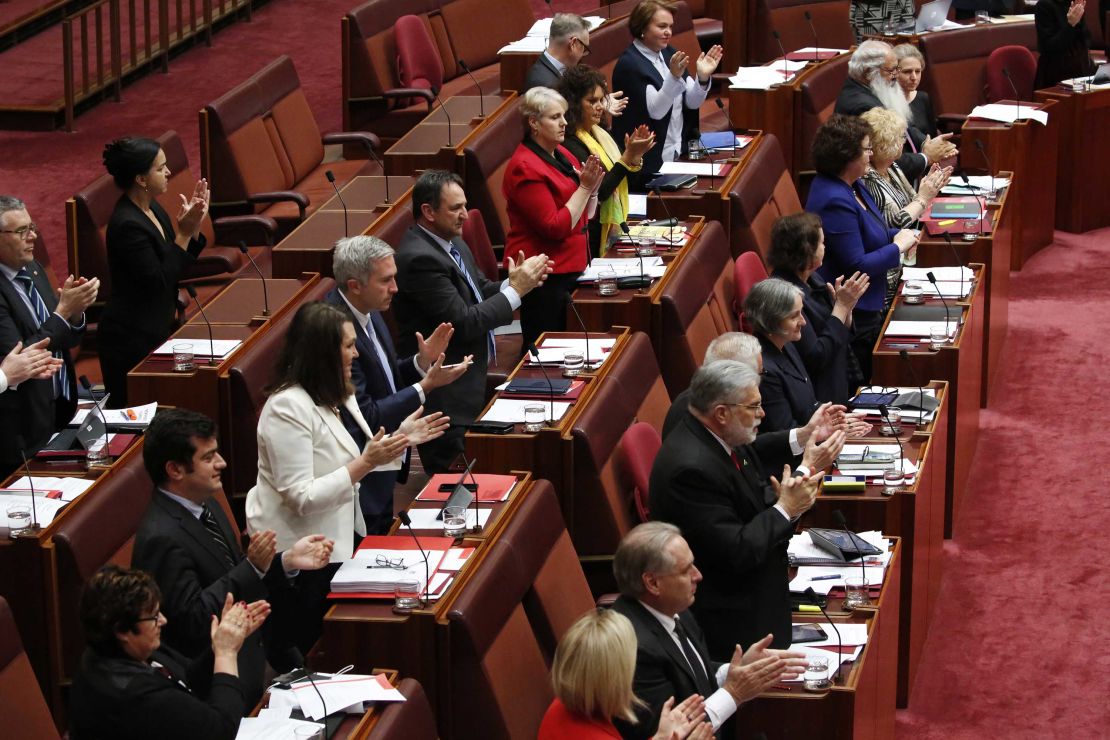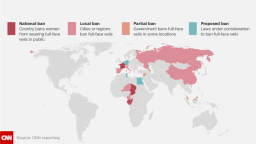Story highlights
Anti-Muslim politician wears burqa in Australian senate session
Politicians decry action as a "stunt"
An Australian senator known for her strong stance against Muslim immigration has been widely condemned for wearing a burqa to Parliament House.
In video of the parliamentary session, One Nation leader Pauline Hanson can be seen taking her seat in the floor-length Islamic garment. A voice on the recording can be heard saying, “What on Earth?”
Hanson has long called for the burqa to be banned in public, saying the central issue is the “right of others to see a face.”

Amid unrest from her fellow senators, Hanson dramatically took off the veil, saying “I’m quite happy to remove this because it’s not what should belong in this parliament.”
Hanson then asked Attorney General George Brandis, if “in light of what is happening with national security… will you work to ban the burqa?”

Brandis, a member of the governing Liberal National coalition, received a standing ovation when, close to tears, he tore into Hanson for mocking the Muslim dress.
“Senator Hanson, no, we will not be banning the burqa.”
“Senator Hanson, I’m not going to pretend to ignore the stunt that you have tried to pull today by arriving in the chamber dressed in a burqa, when we all know you are not an adherent of the Islamic faith.”
He told Hanson to be “very, very careful” of offending the “religious sensibilities of other Australians.”
“To ridicule that community, to drive it into a corner, to mock its religious garments is an appalling thing to do,” he said.
Terror threat
In a speech to Parliament, Hanson referred to terror threats as one reason for her proposed ban.
Australia’s terrorism threat level is currently listed as “probable,” on a four level scale between “possible” and “expected.”
Last month, Australian authorities thwarted alleged twin terror plots described as the “most sophisticated” ever planned on Australian soil. They included plans to release a toxic gas in public.
Since Australia’s national terrorism threat level was last raised in September 2014, there have been five attacks and 13 “major counter terrorism disruptions,” according to a representative for the Australian Security Intelligence Organization.
In her speech, Hanson cited an attack on the Iranian parliament building in June, by men believed to be dressed in burqas, as being one example of the security threat.
“This is not the first case of this kind and it will not be the last,” she said.

Growing Muslim population
The issue of burqa bans flared across the West last year amid calls to ban the full-length garment. They’re already banned in France, Belgium, Austria and Switzerland. Earlier this year, the German parliament voted in favor of a partial ban, backed by Prime Minister Angela Merkel.

In a Facebook post, Hanson said: “I have long believed that full face coverings, such as the burqa, were oppressive, presented barriers to assimilation, disadvantaged women from finding employment, were causing issues inside our justice system, presented a clear security threat and has no place in modern Western society.”
According to a Pew Research Center poll released in February, around half of Australian surveyed said that sharing the customs and traditions of the country is very important to anyone to be considered “truly” Australian.
There are around 600,000 Muslims in Australia – about 2.6% of the population – according to 2016 Census data.
The Australian far right has long attempted to ban face-covering Muslim clothing, however, Prime Minister Malcolm Turnbull has insisted that it won’t happen.
Burqa, hijab, niqab: What's what?
Divisive figure
This is not the first time Pauline Hanson has captured the political spotlight in Australia.
The far-right politician became a national figure in Australia in 1996 when during her first speech to Parliament, after being elected as an independent MP, she said the country was at risk of being “swamped by Asians.”
Among the policies of Hanson’s One Nation party are surveillance cameras in mosques, stopping Muslim immigration to Australia and holding a national inquiry into Islam.
She was found guilty of fraudulently obtaining $500,000 in election funding in 2003 and spent 11 weeks in jail before successfully appealing.
Hanson has run in numerous elections, including the 2007 and 2013 general votes, but has failed to win a seat until now. She also appeared on several reality TV shows, including Australia’s Celebrity Apprentice in 2011.
While the populist has been compared by some in the Australian media to US President Donald Trump – and Hanson herself boasted of being invited to his inauguration – his administration recently listed her political party a threat to religious freedom.
The International Religious Freedom Report, published annually by the US government, highlights the campaign platform of Hanson’s One Nation Party, which included “cessation of Muslim immigration and limits on some Islamic practices,” among an executive summary of the current status of religious freedom in Australia.
Online criticism
The politician was widely criticized online for her recent stunt, by the public and fellow politicians.
One Twitter user, apparently a Melbourne-based, hijab-wearing Muslim woman, condemned Hanson’s act.
“Our choice of clothing and religious expression is not your political football,” she wrote.
Some, however, applauded her move.
“Pauline Hanson made a very powerful statement in the Australian Senate by wearing a burqa,” one commenter wrote. “And Australian senators couldn’t stomach it!”
Opposition leader Bill Shorten said the politician’s “stunt” was “beneath contempt.”








